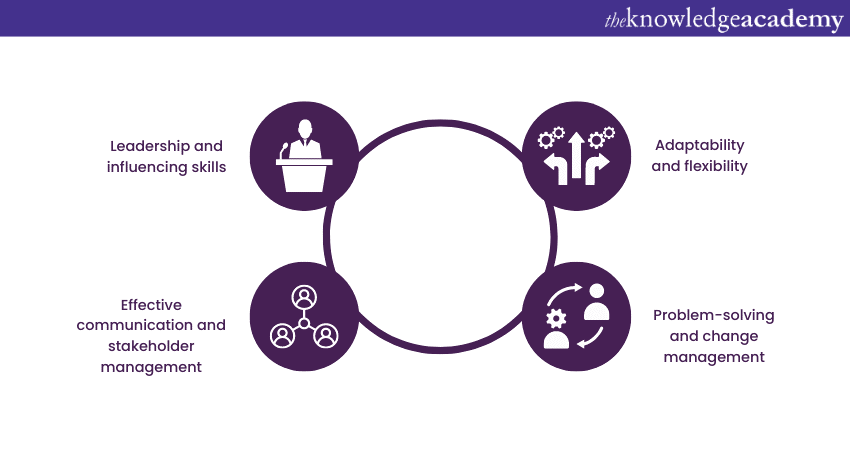We may not have the course you’re looking for. If you enquire or give us a call on 01344203999 and speak to our training experts, we may still be able to help with your training requirements.
We ensure quality, budget-alignment, and timely delivery by our expert instructors.

Change agents play a critical role in driving successful transformations within organisations. To excel in this role, they must navigate complexities, overcome resistance, and guide organisations towards sustainable change. There are several skills that a change agent should possess, out of which the Top 4 Change Agent Skills are leadership and influencing, effective communication and stakeholder management, adaptability and flexibility, problem-solving and change management.
By mastering these abilities, change agents become catalysts for change, empowering organisations to embrace transformation and thrive in today's ever-evolving business landscape. In this blog, we will explore the Top 4 Change Agent Skills essential for effectively introducing and managing change in the organisation.
Table of Contents
1) The Top 4 Change Agent Skills
a) Leadership and influencing skills
b) Effective communication and stakeholder management
c) Adaptability and flexibility
d) Problem-solving and change management
2) Conclusion
The Top 4 Change Agent Skills

Change agents play a crucial role in driving successful organisational transformations. Change agents must possess specific abilities to navigate the complexities of change and guide organisations towards sustainable success. Let's look at the Top 4 Change Agent Skills.

Leadership and influencing skills
Agile change agents must have strong leadership and influencing skills to inspire and motivate individuals and teams throughout the change journey. They must lead by example, exhibiting empathy and resilience. Effective change agents articulate a compelling vision, communicate the benefits of change, and align stakeholders with the transformation goals.
By building trust and fostering open dialogue, change agents influence decision-making processes and drive collaboration among diverse stakeholders. They empower individuals to embrace new ways of working and create a sense of ownership and commitment to the transformation.
Leadership and influencing abilities also involve active listening and empathising with stakeholders. Change agents understand the concerns and perspectives of individuals and manage resistance by addressing their fears and providing support. By engaging stakeholders and inspiring them to embrace the change, such agents create a positive environment that fosters collaboration and accelerates the transformation process.
Effective communication and stakeholder management
Change agents must be exceptional communicators and adept at stakeholder management. Effective communication is crucial for conveying the transformation's vision, goals, and progress. They must be able to clearly articulate complex ideas and concepts in a way that resonates with different audiences. They adapt their communication style to suit the needs of various stakeholders, ensuring that the message is understood and embraced.
Stakeholder management involves building strong relationships with stakeholders at all levels of the organisation. Change agents actively engage with executives, managers, and frontline employees to understand their needs, concerns, and expectations. Involving stakeholders throughout the change process creates a sense of ownership and commitment. They address stakeholder concerns, provide support, and communicate effectively between all parties involved. Through effective communication and stakeholder management, change agents establish a collaborative environment that promotes trust, transparency, and engagement.
Learn the agile approach for project management with our Agile Project Management Foundation & Practitioner (AgilePM®) course. Join today!
Adaptability and flexibility
Change agents must possess adaptability and flexibility in today's fast-paced and ever-changing business environment. They must navigate ambiguity, embrace uncertainty, and quickly adjust their strategies as circumstances evolve. Change agents open to new ideas, feedback, and willing to learn from failures are better equipped to guide organisations through transformational journeys.
Adaptability and flexibility also involve staying updated with emerging trends and best practices. Change agents continuously scan the external landscape, seeking opportunities for innovation and improvement. By bringing fresh insights to the organisation, they promote a culture of learning and growth. The change agents can effectively respond to challenges and seize success opportunities only by adapting to the changing circumstances.
Problem-solving and change management
Agile Change Agents must be skilled problem solvers with expertise in change management methodologies. They analyse complex organisational issues, identify root causes, and develop pragmatic solutions. By leveraging change management frameworks such as Awareness, Desire, Knowledge, Ability, and Reinforcement (ADKAR) or Kotter's 8-Step Model, change agents create structured approaches for managing change. They develop comprehensive change management plans, anticipate and mitigate risks, and establish metrics to measure the success of the transformation.
Problem-solving and change management abilities also involve providing ongoing support to individuals and teams. Change agents help individuals overcome resistance, adapt to new processes, and navigate through the emotional aspects of change. They provide coaching, training, and resources to empower individuals to embrace change and achieve success. While implementing agile methodologies, change agents should be aware of the challenges of agile project management. By facilitating a smooth transition and addressing challenges along the way, change agents ensure that the organisation achieves the desired outcomes of the transformation.
Learn to successfully introduce change at your workplace with our comprehensive Agile Change Agent course. Join now!
Conclusion
In this blog, we explained the Top 4 Change Agent Skills essential for effectively introducing and managing change in an organisation, regardless of size. Change is an inevitable part of business operations and is vital for the company's success. Although leadership and communication is an essential skill, it is also integral to introducing and managing change in the organisation. Problem-solving, adaptability, and flexibility allow change agents to identify problems and resolve them before they cause any damage to the company.
Join our Agile Training courses today and gain the skills and knowledge to drive successful transformations.
Upcoming Project Management Resources Batches & Dates
Date
 Agile Change Agent
Agile Change Agent
Thu 1st May 2025
Thu 11th Sep 2025
Thu 4th Dec 2025






 Top Rated Course
Top Rated Course


 If you wish to make any changes to your course, please
If you wish to make any changes to your course, please


